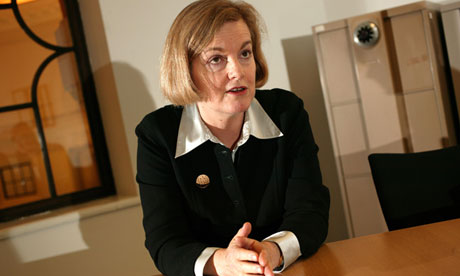
Rachel Lomax: 'Where is the revolutionary thinking?' Photograph: David Sillitoe for the Guardian
Rachel Lomax is practically the definition of establishment: Cheltenham Ladies' College followed by Cambridge and the LSE; principal private secretary to then-chancellor Nigel Lawson; deputy governor of the Bank of England for five years until 2008. Which makes what she said on Friday evening all the more startling.
This being a debate on the future of capitalism in the People's Republic of Bristol, the audience were satisfyingly radical – but Lomax was just as bluntly and disarmingly political. The former Treasury mandarin made no bones about admitting that she had been part of a project of "dismantling a version of capitalism" and replacing it with "Anglo-American neo-liberalism". You'd struggle to get scholars of Thatcherism to speak with such straightforwardness, but here it was coming from one of the era's key backroom players.
And now this co-architect of Britain's economic model as good as admitted that the system she had helped create was broken. But Lomax had one question: "Where is the revolutionary thinking?"
You surely couldn't ask for a better measure of the economic mess we're in, that even members of the establishment are now calling for revolution.
Striking as it is, such despair isn't exceptional. Indeed, it now appears endemic among the policy-making elite. Whether you look at Westminster or Threadneedle Street, Britain's economic officials reek of policy fatigue – of having riffled through all the pages in their textbooks without getting a good answer.
Lomax's former colleagues at the Bank of England have chucked £375bn at the economy as part of a quantitative-easing programme – to no great avail. Five years after the collapse of Northern Rock, Mervyn King is warning that the slump may last another half a decade. And as will become clear when George Osborne delivers next week's pre-budget report, the chancellor no longer bothers to pretend that his cuts are working, but simply (and correctly) maintains that things would be about as bad under Labour's existing plans.
For the rest of us, that means all those gloomy warnings about a Japan-style lost decade in wages and economic growth look like coming true. Except that in Britain, with its vast inequality and lack of social cohesion, the effects of such a long and stubborn stagnation are likely to be far worse than those borne by the Japanese. If ever there was a time for new ideas, this is it – yet there's barely even a serious economic debate.
But the giant hole spotted by Lomax is one she and her colleagues have helped cause, by practising a narrow, corrupted form of economics.
In their new book, Economists and the Powerful, Norbert Häring and Niall Douglas trace how the most powerful of all the social sciences became a doctrine for helping the rich – with the aid of huge sums from business. You may be familiar with a version of this critique, thanks to the film Inside Job, which described how some of the best-known economists practising today are in the pay of Wall Street. But the history unearthed by Häring and Douglas is far more disturbing – because they argue that vested interests have slanted some of economics' most fundamental ideas.
Take the Rand corporation, an American cold-war institution that the book describes as closely linked to the Ford Foundation, which in turn was closely linked to the CIA. "It is hard to overestimate Rand's impact on the modern economic mainstream, let alone modern society," write the authors, who tot up at least 32 Nobel laureates with links with the organisation, including some of the biggest names in economics, such as Kenneth Arrow and Mancur Olson. Yet the economics it promoted assumed a society that was highly individualistic and rational. In other words, nothing like society as most of us know it, with its organisations and institutions and cultures. But the Rand researchers got round that problem by producing heavily theoretical and maths-based work, and ignoring empirical reality. From there it was a short step to the neoliberal politics everyone knows today: the kind that argues there is no such thing as society.
By focusing on the economics of economics, the authors describe an evolution of the discipline that barely anyone talks about. It is a kind of corruptonomics: "An effort that was generously funded by businessmen and the military in the name of cementing the power and legitimacy of their selves and their beliefs."
What makes this argument so striking is that Häring started off as a "true believer" in economics. He did his PhD under one of the most eminent academics in Germany, before waltzing off to a highly paid job with Commerzbank. It took him years of delving into the archives to arrive, reluctantly at first, at the conclusion that the subject he had spent years studying and practising was rotten. And while the influence of money on the discipline is largely a US phenomenon, the lopsided subject it produced is now taught at all the leading universities and practised at the major institutions.
The IMF and the World Bank employ economists from all over the world, but it is striking how many of them come from so few universities.
This then is at least part of the answer to Lomax's question. Mainstream economics now preaches a dogma that is particularly agreeable to the elite and has chased most dissenters out of its faculties. Meanwhile the other social sciences lack the confidence or the resources to take on economics. Where's the revolutionary thinking? I suspect Lomax, and others, will be asking that question for a long time.
